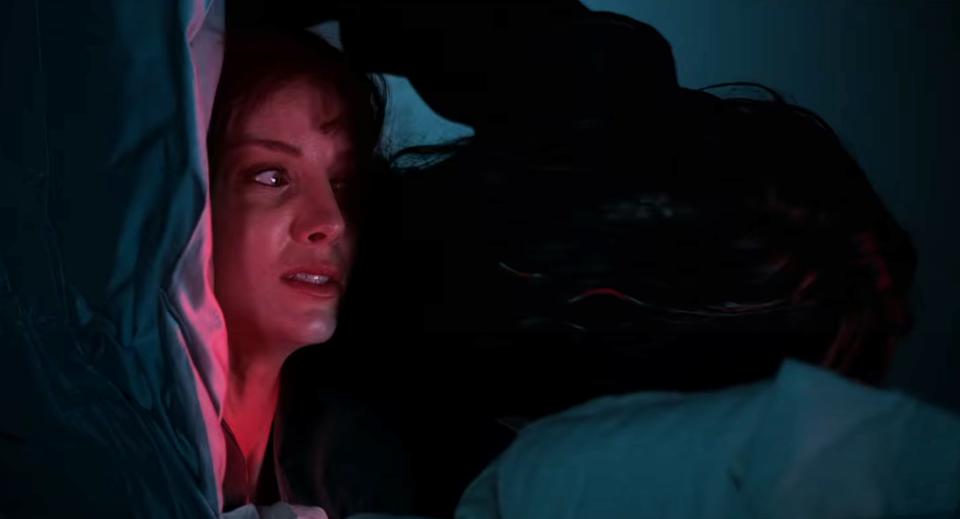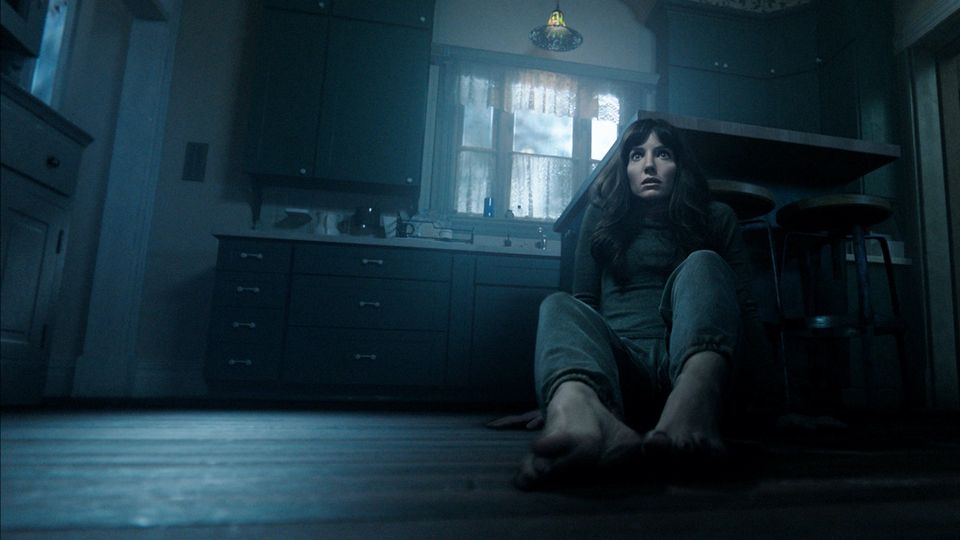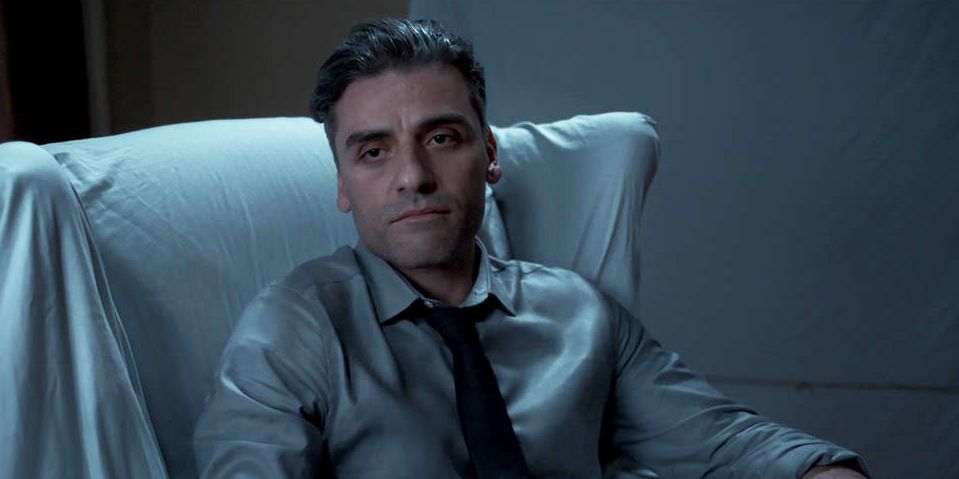
Last Sunday, the critic Walter Chaw tweeted that, because more than 90% of the new movies he watches are “pretty much the same”, he’s more likely to appreciate a film that “just cocks an arm and swings for all it’s worth”. I might quibble with the mathematical accuracy of his first statement, but despite the mixed metaphor, I’m inclined to agree with his second; even when they fail, ambitious movies tend to be more memorable than their cautious counterparts. Chaw presumably had a specific picture in mind, but this past weekend provided multiple titles that refused to play by multiplex rules. One is far better than the other, but both succeed in upending expectations and carving out their own atypical territory.
At the outset—and, in fact, for the majority of its running time—James Wan’s Malignant isn’t especially novel. Despite stemming from a nominally original screenplay by Akela Cooper, it’s another haunted-house chiller that would fit snugly inside the Conjuring cinematic universe that Wan created back in 2013. Its heroine, Madison (Annabelle Wallis, best known to me as Grace on Peaky Blinders), is plagued by visions of a malevolent spirit called Gabriel, one of those shadowy creatures who’s never quite in focus but who looks a bit like the skeleton-masked bank robbers from The Town, only blacker and nastier. In addition to somehow speaking through electronic devices like a demonic Siri, Gabriel seems to be a burgeoning serial killer, and Madison—in an arresting manipulation of the image—periodically finds her mind transported to the sites of his murders, forced to watch his grisly wet work like a helpless, paralyzed bystander.

When it comes to generating tension, Malignant is somehow skillful and schlocky at once. Wan’s technique is accomplished; his camera moves are smooth (the cinematographer is Michael Burgess), and he’s clever with depth of field, often placing a threat in the background or corner of the screen. Still, his method has grown glib and gimmicky, curdling the putative suspense into stale leftovers from his prior features. The repetition is monotonous: Over and over, a character finds themself cowering in a dark room, shrinking from an invisible spectral presence nearby, until the suffocating silence suddenly explodes into shrieks of strings and spurts of blood. The steadily encroaching dread of The Conjuring’s brilliant hide-and-clap sequence has devolved into a perfunctory parade of unmemorable jolt scares.

This goes on for some time, and in quantitative terms—that is, in weighing the number of minutes I enjoyed watching it against the number of minutes I found it tedious and trite—I don’t think Malignant is a very good movie. But I’m still compelled to recommend it, because in its final half-hour, it takes a sudden swerve, shifting gears from mechanically creepy to gleefully deranged. There are two major twists—one fairly predictable, the other decidedly less so—yet they’re less important for how they distort the plot than for how they change the tone. (There is also a very funny scene in which a minor character crashes through an attic floor.) Wan made his bones concocting nightmarish scenarios of dank darkness that evoked the horror classics of the ’70s, but here he proves far more adept at choreographing brightly lit, freewheeling mayhem; the film’s pièce de résistance is a rampage of gnarly violence in a police station that pays tribute to an unexpected ’80s landmark, The Terminator. (Whether it also qualifies as giallo, I leave to the discourse.)
The climax of Malignant is so wildly entertaining—bold, zany, operatic—it’s almost annoying that what precedes it is so mundane. But the maniacal verve of the final act still operates to partially redeem the sluggish first hour. The whole is probably less than the sum of its parts, but the last part can plug an awfully big hole.

There are no supernatural murder sprees in Paul Schrader’s The Card Counter, but in its own tightly controlled way, it’s as unusual and quixotic as Malignant. Consider: Whenever its protagonist enters a new motel room, the first thing he does is cover all of the furniture in white sheets, which he fastens with strips of rope. The film eventually implies a reason for this bizarre behavior, but it’s most interesting as a metaphor for Schrader’s own meticulous approach to filmmaking. The Taxi Driver screenwriter has had a weird career—it wasn’t that long ago he was making a misbegotten thriller featuring Lindsay Lohan and a porn star—but he recently righted himself with First Reformed, an intellectually laden character study (faith versus science, ecological allegory, what have you) that sported a boxy aspect ratio and a gripping Ethan Hawke performance. The spiritual reckonings of his newest picture are less overtly religious (though no less agonizing), but it shares with its predecessor a painstaking rigor, not to mention a deepening sense of despair.
Not immediately, though. When The Card Counter opens, its fiercely poised antihero, an ex-con named Bill Tell (a fantastic Oscar Isaac), seems entirely comfortable with his regimented existence. As he explains in a dispassionate voiceover that might remind you of a certain New York cabbie, he systematically cheats casinos via his gift for memory and calculation, but he keeps his winnings small to avoid attracting unwanted attention. The consummate loner, Bill armors himself in nigh-monkish temperance; he refuses to get attached to others, he never seeks huge scores, and he resists dwelling on the past. Suffice it to say that he will surrender all of these self-imposed safeguards before the movie is over.
Though a number of its scenes take place in casinos—including an early explanation of its titular process, complete with visual flourishes—The Card Counter isn’t really a poker film. It’s closer to a “one last job” flick, as Bill grudgingly relinquishes his principles and agrees to be staked by an investor (Tiffany Haddish) who eyes him as a prize pig, though he insists that their arrangement terminate after one year. Even here, though, Schrader eschews traditional suspense and catharsis; there are no big-ticket hands, no monumental bets, no gasp-worthy flips of aces in the hole. (The one hand that does unfold in detail concludes with a quiet bluff and no additional commentary.) Schrader recognizes a key truth—watching other people play poker is boring—which is why he’s less interested in the cards than in the man holding them.

For this reason, the real meat of The Card Counter is the curious relationship that blooms between Bill and Cirk (Tye Sheridan), a rudderless youth who’s vaguely linked to Bill’s pre-incarceration stint as a soldier, and whom the gambler surprisingly takes under his wing. Their surrogate father-son bonding (which recalls Paul Thomas Anderson’s Hard Eight) isn’t initially persuasive, but as the screenplay gradually leaks out details of Bill’s troubled past, it becomes more credible. Likewise, while Sheridan’s blankness as an actor can prove fatal to a film where he’s asked to carry the emotional load (like Voyagers), he proves a sensible fit opposite Isaac, who can chill you with a single glance. Bill’s coiled intensity——the spring-loaded way that he’s consistently on an even keel yet always seems capable of erupting—is scarier than any of the ghoulish phantasms in Malignant, and Isaac lasers the character, shaping him into someone who’s calm and crazed at once.
This makes him an ideal lead actor for Schrader, who prefers to gesture toward the potential for cataclysm rather than to reveal it outright. For the most part, his craftsmanship in The Card Counter is gorgeously supple, with precise camera moves and elegant framing; the movie’s most thrilling shot is simply a slow, Godfather-style push in on Isaac’s face as he delivers a terrifying monologue about the noise and the stench of his time as a guard at Abu Ghraib. This abiding restraint only further energizes the handful of flashbacks to those ghastly days, which Schrader films in a different style entirely—fish-eye lenses, washed-out colors, and a fast-moving camera that rushes past all manner of human cruelty. Yet the picture can be strangely beautiful, too, as in a luminous sequence where two budding lovers grasp hands amid a parade of dotted lights. There are even a handful of Springsteen-esque ballads (by Robert Levon Been) that help offset the impending sense of doom, which is naturally embodied in the sinister person of Willem Dafoe.
The Card Counter isn’t perfect; it can’t always reconcile its brooding relentlessness with its more lyrical impulses. (It also repeatedly features players who call a bet and then instantly show their cards, something no professional gambler would ever do.) But its combination of menace and grace is uncommon in cinema, and it results in a rare electricity. Its arrhythmic rigor keeps you off balance, even as you can’t help but exult in the brash confidence of a movie willing to risk it all.
Malignant grade: B-
The Card Counter grade: B+
Jeremy Beck is the editor-in-chief of MovieManifesto. He watches more movies and television than he probably should.
